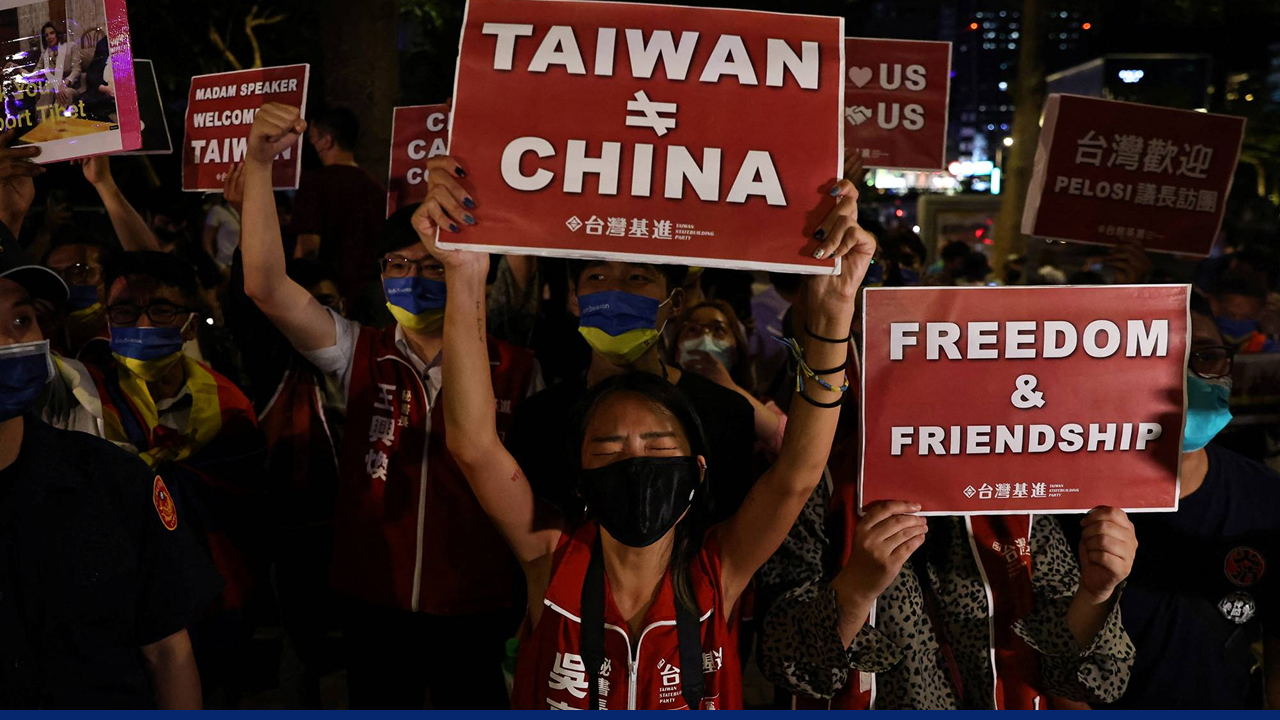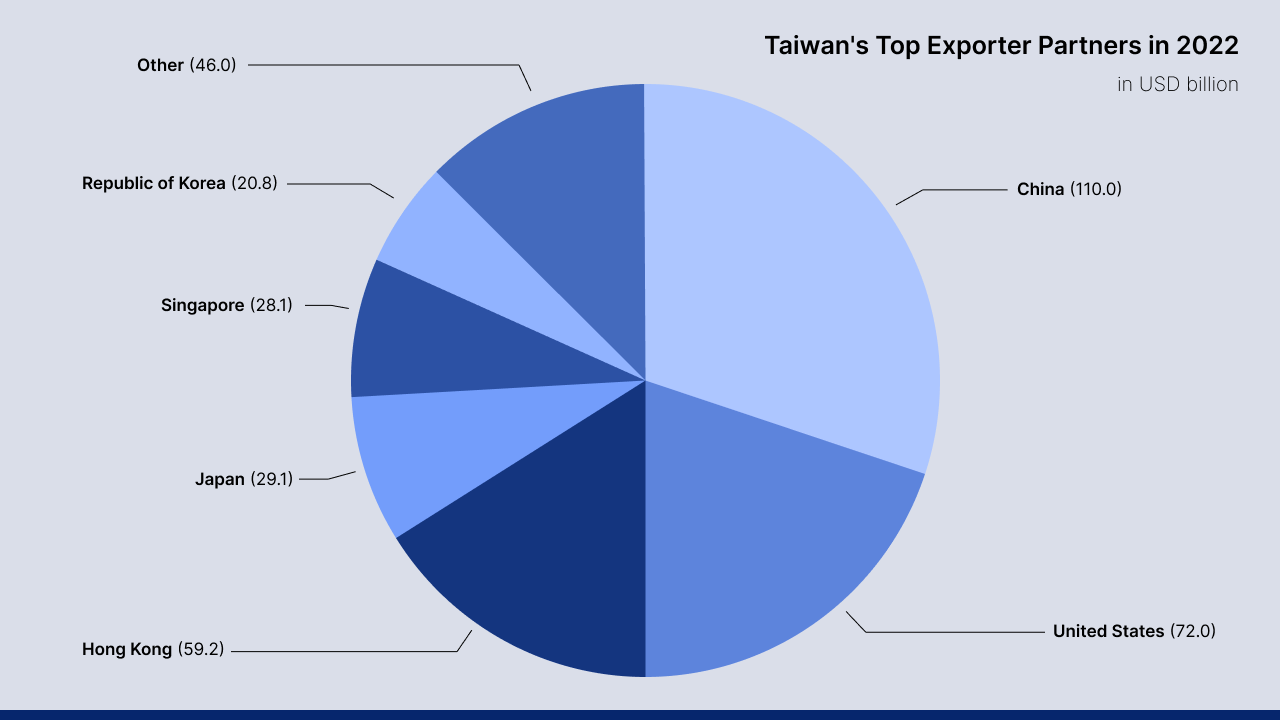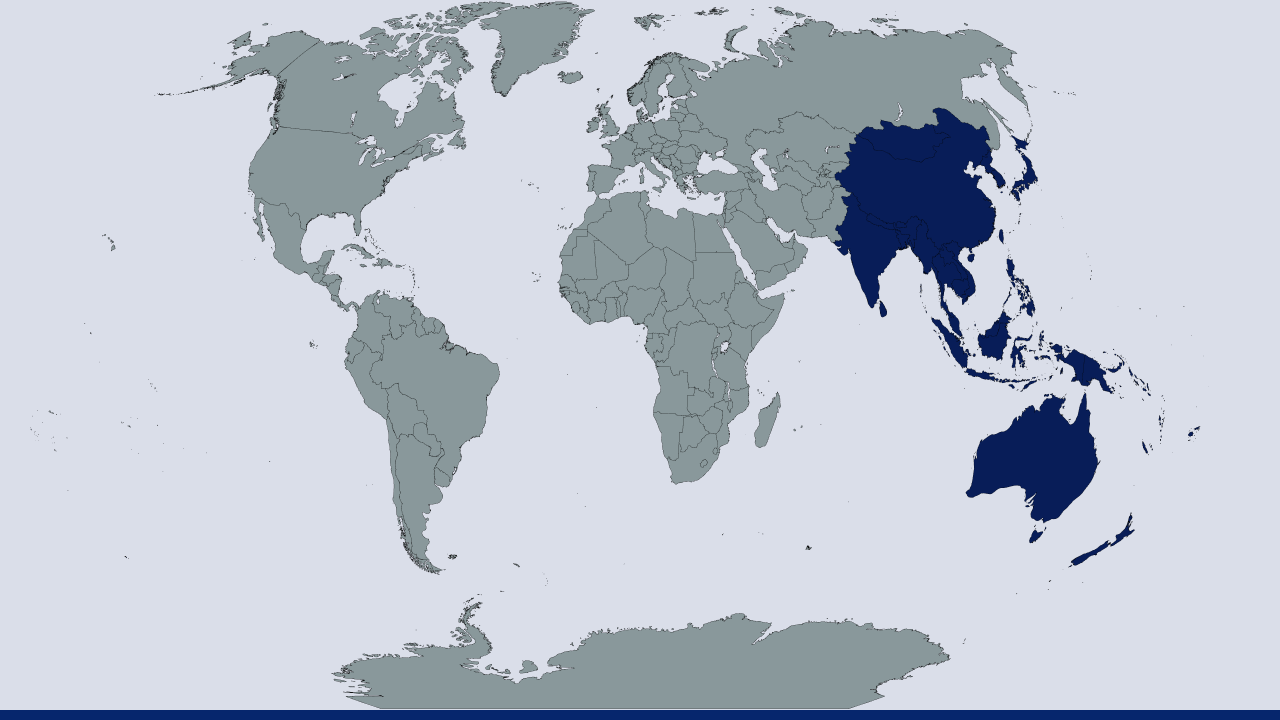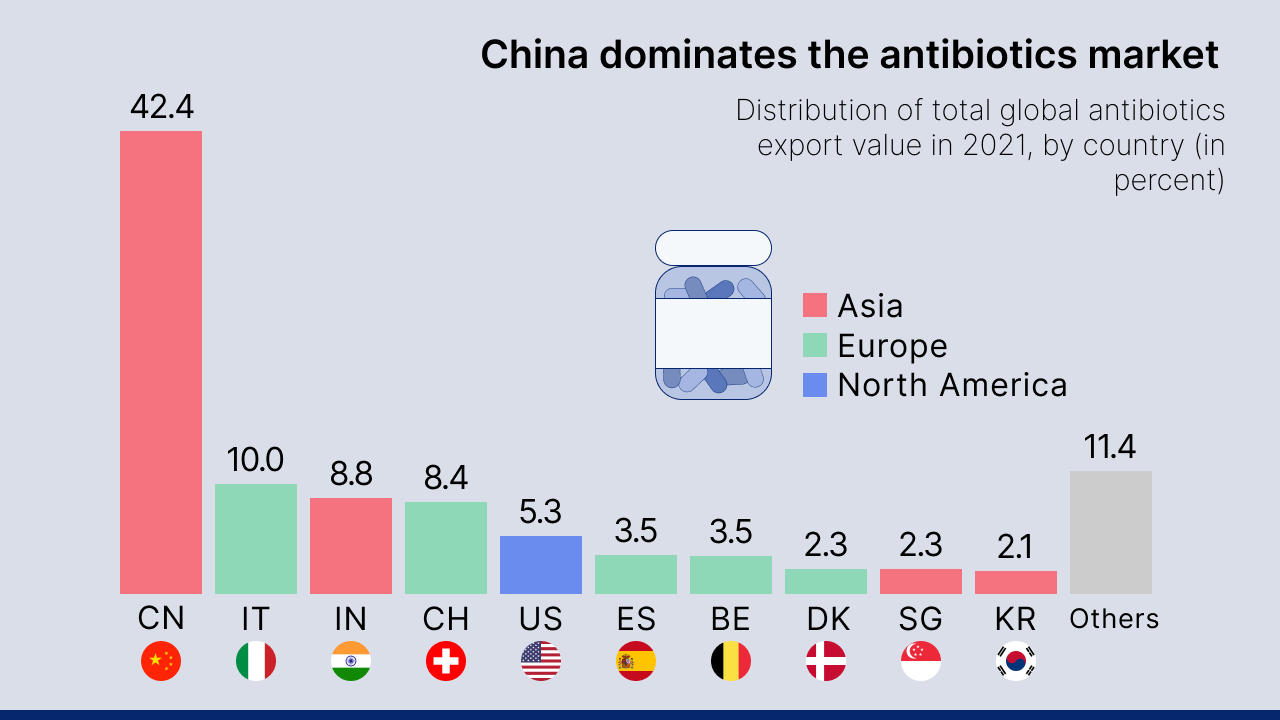27 Mar 2025
9 MIN READ
10 Major Consequences of a China-Taiwan Conflict

Protests erupted during Nancy Pelosi’s expected visit to Taipei. Credits: Reuters
The CCP, the national party of China, has long claimed Taiwan as part of its administration. They identify the island as its “core” national interest, an inherent part of China. The CCP campaigned in 2021 to “reunify” mainland China with the island.
In 2021, Chinese President Xi Jinping said, “Resolving the Taiwan question is a historic mission and a commitment of the CCP.” The China-Taiwan conflict escalated after military exercises in the Taiwan Strait. This was a response from China to US representative Nancy Pelosi's visit to Taiwan.
The conflict is regional but will have major global ramifications. It will impact the global economy, the global supply chain, and global trade, to name a few. Tensions could evolve into an all-out war between the two, leading to a humanitarian crisis.
Economic consequences
The global economic disruption

A graph of Taiwan’s top export partners. Credits: AI Habtoor Research Centre
The domino effect of the China-Taiwan conflict will disrupt global economic operations. Bloomberg economists predict $5 Tn in economic damage in the first year, which amounts to a 5% drop in the global economy. Taiwan's economy would suffer a 12% loss, and China’s economy would experience a 9% loss. The return of Donald Trump injects a more transactional approach to Washington’s relations with Taiwan.
Taiwan is the world’s 16th largest trading economy, importing and exporting $922 Bn in goods and services in 2021. The blockade will threaten almost 50% of Taiwan’s value-added trade.
The conflict would spike inflation and shortages in key industries ranging from medical and telecommunication equipment to harvesting or mining. This will increase global economic recession, sustained inflation, sovereign defaults, rising unemployment, and potential social unrest.
The global supply chain disruption
Taiwan produces 92% of the world’s most advanced logic chips, including a third to half of the critical chips. The China-Taiwan military conflict will cripple the supply chain of semiconductors transited globally.
Taiwan also produces the most advanced technology and is a hub for microchip fabrication. It would take an estimated $350 billion and three years to replace Taiwan’s semiconductor capacity.
The Taiwan Strait is a primary route for shipping many manufactured goods globally. This includes shipping between countries of China, Japan, South Korea, and Europe. Turbulence in the Taiwan Strait will disrupt the global supply chain.
The blockade could impact China’s international trade by an estimated 20%, impacting electronics, textiles, plastic, rubber, chemicals, and base metals exports.
Trade with China disruptions
Risk-averse investors would withdraw from lending activities during the China-Taiwan conflict, resulting in a trade finance deficit and impairing global trade. Trade finance with China would reach levels seen during the global financial crisis.
This could disrupt more than $270 Bn in trade between China and the rest of the world. Global liquidity and Trump’s sanctions pose serious threats. Domestic economic conditions in China will be affected as the semiconductor value chain gets disrupted.
Investors would seek to move money out of China, straining its exchange rate. The People’s Bank of China and other capital controls could not fully contain the losses. This might weaken the Chinese yuan, reducing China’s imports from the rest of the world.
Global Trade Finance Disruptions
In case of a conflict, foreign investors would dump their holdings in Chinese securities. An example of this scenario would be the Russian MOEX stock index, which has fallen nearly 30% from its October 2021 peak since the Russian- Ukraine war.
The conflict would also risk around $100 billion in annual investment and lending flows, with Sri Lanka, Pakistan, and Laos being the most affected. This would affect $127 billion in direct investment to and from Taiwan, and MNCs would face immediate revenue risks.
Beijing could impose capital controls in response to global capital flight. This could hinder multinational companies' ability to repatriate profits. These companies could also face a situation of nationalization or asset seizure.
Regional security consequences
Impact on the Asia-Pacific region

A geographical map of the Asia-Pacific region. Credits: Union for International Cancer Control.
Across the Indo-Pacific region, the Chinese Communist Party (CCP) uses military and economic measures to threaten its neighbors, advance unlawful maritime claims, bully naval shipping lanes, and destabilize territory along the People’s Republic of China (PRC).
The international community’s unalignment in response to China's aggression with Taiwan has caused the Asia-Pacific tensions. China establishes global logistics and basing infrastructure, allowing the People’s Liberation Army (PLA) to project and sustain military power.
Countries inadvertently support their military expansion and Beijing’s revisionist geopolitical goals by granting China control of ports and other facilities. US policy nudges ASEAN nations to counter Chinese activities in the South China Sea. However, these nations are hesitant to revolt against China.
Disruption in Food Supply
Taiwan's conflict with China will disrupt global food security. Supply shortages and high prices are the primary factors. Taiwan’s total seafood imports reached $2.1 Bn in 2022. Disruption has already been evident since 2022.
Taiwan recorded a seafood trade deficit of $464 Mn in 2022 due to the abrupt political boycott from China. They import seafood from 125 countries, of which the top 10 comprise around 70 percent of the total imported value.
China is the largest supplier of foreign seafood to Taiwan, with an 11 percent market share. The Taiwan Fisheries Agency reports domestic seafood production stagnation in tonnes as the cross-strait political tension continues.
Technology & Energy consequences
![]()
A graph on global revenues from semiconductors. Credits: Bertelsmann Stiftung
Impact on technology and innovations
Taiwan is home to TSMC (Taiwan Semiconductor Manufacturing Company), one of the world's most valuable and crucial chip companies. Their customers include Apple, AMD, and Nvidia.
The China-Taiwan conflict would lead to a chip shortage, which could disrupt our lives. We previously experienced the impact of chip shortages during and after COVID-19. China’s control of TSMC will give it a technological advantage over the rest of the world.
While a potential invasion disrupts the semiconductor leader, the constant pressure also impacts it. Potential diversification can lead to a brain drain, as many skilled workers may move to other countries.
This diversification will dilute TSMC’s status quo and increase its dependence on external markets. If Taiwan loses its market leadership, the countries supporting it, including the US, might rethink their position, which could potentially push Taiwan into oblivion.
Impact on Power Energy
Taiwan aims for carbon neutrality by 20250 without reliance on nuclear power. However, in 2023, natural gas accounted for about 40 percent of Taiwan’s electricity generation. This dependency would increase with the continued shutdown of nuclear and coal-fired power plants.
The nature of LNG demands ultra-low temperatures for storage, which also proves to be a challenge. Taiwan has an 11-day LNG reserve and a 42-day coal reserve. This means if China imposes a blockade, Taiwan will run out of energy within weeks. LNG costs also play a major role as a significant portion, up to 30%, is sourced from the spot market.
Taiwan’s offshore wind development “Phase 3” plans to install 3 GW every two years between 2026 and 2035. However, this project is concentrated on the Taiwan Strait, which could become an easy target for China. The recently elected Lai Ching-te’s administration faces the challenge of implementing policies with a minority government.
Global pharmaceutical industries' consequences

An Image of how China dominates the antibiotics markets. Credit: Statista
China has become a pharmaceutical powerhouse over the past twenty years because of its dominance in unbranded medicine. It is also a major exporter of antibiotics and other ingredients used to make critical drugs.
“If China attacks Taiwan … and we sanctioned it like we did Russia, the pharmaceutical market would be turned upside down,” said Gian Paolo Negrisoli, chief executive of pharmaceutical manufacturer Flamma Group.
A study by IQVIA for the European Fine Chemicals Group estimates that Europe depends on Asia for 3/4 of its pharmaceutical ingredients and precursor chemicals. While measures like the EU’s recently announced “Critical Medicine Act” relieve the supply of critical medicines and diversify health infrastructures, their implementation and operation during a blockade could become an issue.
Global humanitarian consequences
Though the island has a relatively small population, reunification can significantly impact. Since most of the Taiwanese population has forgotten their Chinese roots, this reunification can have significant psychological effects.
If the blockade escalates to violence, there is a good chance of many deaths and forced displacement of the population. The foreign laborers will have to flee Taiwan. This could result in a global humanitarian crisis.
Beijing also attracts thousands of foreign students and graduates annually. The China-Taiwan conflict will disrupt the flow of foreign students.
People also ask
Q. What would be the effects of China invading Taiwan?
A. The effects of China invading Taiwan will be global. It will send shockwaves to the global economy, energy, regional security, and trade.
Q. What would happen to the world economy if China invades Taiwan?
A. The world economy will be shaken as global trade and supply will be significantly disrupted. Moreover, a maritime conflict at the Taiwan Strait would disturb global trade.
Q. What is the controversy between China and Taiwan?
A. A historical controversy stemmed from China’s campaign to “reunify” the island with mainland China.
Q. What is the China threat to Taiwan?
A. China's threat to Taiwan is the military exercise in the Taiwan Strait following the visit of the Chairman of the People's Representative Council of the United States (US), Nancy Pelosi, to Taiwan.
